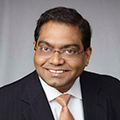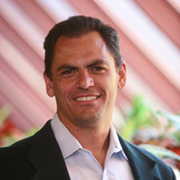Not too many entrepreneurs can lay claim to both successfully growing and selling a startup and working a stint as a stay-at-home dad. But John Dick managed to pull both feats off by the time he was in his early 30s.
In 2001 Dick founded business development and consulting firm GSP Corp, growing it to nine offices nationwide and four profitable business units with a global clientele.
In 2008, Dick Launched Pittsburgh-based CivicScience, which aims to revolutionize polling data, how its collected, and its accuracy. The company boasts it knows “what the world is thinking” by making survey research speedy, easy and meaningful through its proprietary data mining technology.
In the last year, CivicScience has more than doubled its staff to 15, including five new hires in the last four months. Already in early 2013, the company is on pace to increase its commercialization revenue, which only began in 2012, almost tenfold.
What was the inspiration behind CivicScience?
In my first company, we worked a lot with pollsters and marketing research firms. During that time, as more and more consumer moved away from landline telephone, we watched the quality of research services deteriorate while the costs continued to rise. We saw an opportunity to harvest all the small interactions people were having with polls on websites to change the way polling data was collected. With the benefit of the web’s scale and the automation technology we developed, we could provide services that were much cheaper, faster, and more sophisticated.
In my first company, we worked a lot with pollsters and marketing research firms. During that time, as more and more consumer moved away from landline telephone, we watched the quality of research services deteriorate while the costs continued to rise. We saw an opportunity to harvest all the small interactions people were having with polls on websites to change the way polling data was collected. With the benefit of the web’s scale and the automation technology we developed, we could provide services that were much cheaper, faster, and more sophisticated.
What was the biggest challenge in getting CivicScience off the ground?
It was really difficult to recruit the first group of engineers we needed to build out the technology. With no technical background myself, it was hard to attract elite talent to work for a startup like CivicScience. Engineers want to work with other talented engineers, which created a pretty tough chicken-and-egg scenario for me early on.
It was really difficult to recruit the first group of engineers we needed to build out the technology. With no technical background myself, it was hard to attract elite talent to work for a startup like CivicScience. Engineers want to work with other talented engineers, which created a pretty tough chicken-and-egg scenario for me early on.
What resources did you take advantage of to launch CivicScience?
We started in a short-lived incubator called MDS, which was a joint program sponsored by Carnegie Mellon and the Heinz Endowments. They gave us the first roof over our heads and a lot of early technology development support. We were also able to attract investment from the active local angel community to fund our early operations.
We started in a short-lived incubator called MDS, which was a joint program sponsored by Carnegie Mellon and the Heinz Endowments. They gave us the first roof over our heads and a lot of early technology development support. We were also able to attract investment from the active local angel community to fund our early operations.
What resources did you take advantage of to grow CivicScience?
Later, we tapped into the support and funding of InnovationWorks, who has remained a great partner. Their investment structure is reasonable they’ve been very helpful with talent recruitment and PR in particular. The Pittsburgh Technology Council has been a valuable resource for us too. Their local events create a lot of business development opportunities for companies like ours and the work they do outside of the region, evangelizing the virtues of Pittsburgh, give us a lot more credibility when we do business elsewhere.
Later, we tapped into the support and funding of InnovationWorks, who has remained a great partner. Their investment structure is reasonable they’ve been very helpful with talent recruitment and PR in particular. The Pittsburgh Technology Council has been a valuable resource for us too. Their local events create a lot of business development opportunities for companies like ours and the work they do outside of the region, evangelizing the virtues of Pittsburgh, give us a lot more credibility when we do business elsewhere.
What’s the biggest challenge you’ve overcome, personally or professionally?
Overall, I’ve been really blessed in my personal and professional life. To say that I’ve had to overcome any serious challenges, things like health, financial hardship, or anything truly serious like that would be an overstatement. That said, my biggest challenge is in finding balance between my work life and my personal life. With my phone tethered to my hip 24/7, it’s sometimes really difficult to shut off my “work” brain and be present for my family when I need to be. Plus, my wife arguably has a bigger career than I do, so I have to share as much of the responsibilities at home as I can (though she still does way more). Keeping all of those things in perspective, while still focusing on building a great company, is a constant battle for me.
Talk about the moment where you knew you made the right decision in starting this company?
Honestly, once my wife and I decided we could take the risk personally to start CivicScience, I never had an ounce of doubt. There’s still a lot of execution risk but, win or lose, I’m 100% certain it was the right thing to do. I work with brilliant, passionate people every day. We’re trying to solve a problem that needs to be solved. This is exactly what I’m supposed to be doing.
How can we stimulate small business to be an engine for job creation?
I think the public sector, combined with the economic development community, has been doing a great job of supporting entrepreneurship. The Commonwealth of Pennsylvania could do a lot more to modernize its corporate tax system and Pittsburgh can still do more to keep young talent, especially from Carnegie Mellon, in the City. In general, the government needs to be constantly reminded that most net job creation in the future will come from small businesses like ours.
What key partnerships in your region or state have helped CivicScience grow?
I’ve already mentioned InnovationWorks and the Pittsburgh Technology Council. They have been great partners for us. Given that so much of the data we collect comes from newspaper websites, the Pennsylvania Newspaper Association has been a tremendous ally as well. Teri Henning and her team have really embraced what we do and how it can help newspapers get smarter about collecting and using data.
What advantages does being in your region hold for entrepreneurs?
Pittsburgh is an amazing place to build a company. The technical talent coming from CMU is second to none. We have affordable office space in a vibrant and fun part of the City, where half of our team can walk to work. And, my favorite aspect of Pittsburgh is the growing network of other start-ups and entrepreneurs here who go out of their way to help each other. There are a lot of people here who not only want to build special companies but really care about being part of Pittsburgh’s renaissance. We’re always referring each other new business, sharing resources, and just getting together to learn from each other.
Where does your region need to improve in terms of support for entrepreneurs?
The bigger companies in the City, particularly the Fortune 500s, need to wake up to the fact that Pittsburgh is spawning world-leading technology and companies. Often, it feels like the perception of Pittsburgh from outside the region is far more favorable than from the people who are based here. The larger corporations here need to be more open-minded to working with local companies and not just assume that the only sophisticated people are in New York or the Silicon Valley.
What’s the big differentiator for CivicScience?
Our business model is our strongest competitive barrier. Premium websites give us free, prime real estate for polls inside their content because we tell them things about their audience that they can use to sell more profitable ads. This allows us to build a wealth of survey data with none of the fixed costs that plague everyone else in the $20 billion survey industry. From that foundation, we are building products at a level of scale and cost-effectiveness that nobody has achieved in this industry before.
What’s next for CivicScience? Any new products/services, focus or expansion?
There’s almost too much to mention here and more that we simply can’t mention. We have a number of exciting new business discussions ongoing ranging from using our data to predict stock market movements to rolling out our business model internationally. You can expect to see a lot of big news from CivicScience in the next few months.
— by Joe Petrucci


#
6101 Penn Ave. Pittsburgh, Pa. 15206
↑ Top


